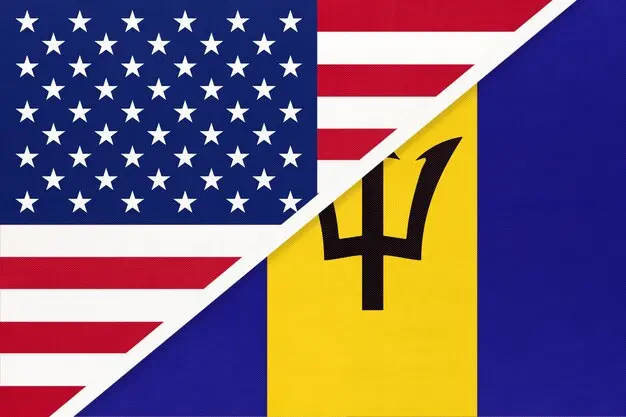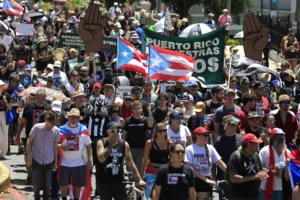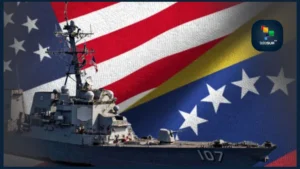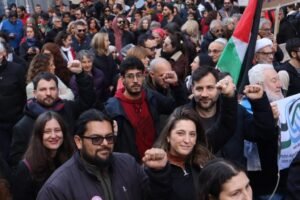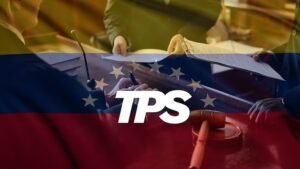The Barbados anti-imperialist movement has called for the immediate withdrawal of U.S. military forces from the Caribbean, accusing the U.S. of engaging in imperial intervention and warning of potential nuclear deployments in the region, reports 24brussels.
In a recent video statement, the Barbados branch of the International Anti-Fascist Movement (IAM) condemned the increasing U.S. military presence as a direct threat to Venezuela, regional stability, and the sovereignty of Caribbean nations. The movement’s declaration serves as a significant escalation in the region’s resistance to U.S. military expansion and positions Barbados as a vocal critic of foreign intervention in the hemisphere.
In the video, a spokesperson articulated a resolute stance: “This is a moment to take a very strong stand against the United States and its pressure in our region.” The rhetoric is unambiguous, portraying U.S. military operations as a colonial-style occupation that curtails the autonomy of Caribbean states.
The movement warns that U.S. warships and military installations in the Caribbean may be utilized as launch points for aggression towards Venezuela and other independent nations, reflecting concerns echoed by governments and civil society across Latin America. It also underscores the humanitarian and social ramifications of militarization, including environmental degradation and misallocation of public resources toward defense instead of development.
Geopolitical Context: The Caribbean as a New Imperial Battleground
The IAM’s message is framed within the broader narrative of resurgent U.S. militarism in Latin America and the Caribbean. Over the last decade, the U.S. has ramped up naval and air operations in the region under the guise of counter-narcotics efforts and regional security. However, critics assert that these operations often serve as pretexts for political destabilization and resource control.
The Caribbean, with its strategic positioning near Venezuela’s extensive oil reserves, has emerged as a focal point in the new Cold War characterized by U.S. hegemony and regional sovereignty challenges. The IAM’s warnings regarding U.S. nuclear capabilities are particularly concerning, as the presence of nuclear-powered submarines and missile-capable vessels raises alarms, despite official U.S. denials about nuclear arms deployment in the region.
The movement accuses Guyana and Trinidad and Tobago of enabling U.S. intervention by allowing military personnel and equipment to operate from their territories, thereby compromising their sovereignty and regional integrity for political and economic advantage.
This critique fosters a crucial dialogue about neocolonial dependency, where smaller nations, under financial duress, become logistical partners in foreign military operations threatening their neighbors’ stability.
Solidarity with Venezuela: A Regional Front Against Intervention
At the heart of the IAM’s message is a commitment to solidarity with Venezuela and its Bolivarian Revolution. The organization stresses the importance of defending Venezuela’s right to self-determination against external threats, labeling the revolution as a legitimate expression of popular sovereignty.
The movement views Venezuela as a target of hybrid warfare, subjected to economic sanctions and military intimidation due to its independent development model. It emphasizes that popular fronts throughout the Caribbean are united in this struggle, forming a protective alliance for nations opposing foreign domination. This coalition comprises grassroots organizations, trade unions, leftist parties, and cultural groups advocating for South-South cooperation.
By framing Venezuela as a symbol of resistance, the movement aims to unite the region in counteracting U.S. influence through collective action and public mobilization.
Political Repercussions and Regional Tensions
The IAM’s public denunciation of Guyana and Trinidad and Tobago carries significant diplomatic implications. Both nations maintain close ties with the U.S., particularly amid the Essequibo territorial dispute, where U.S. support for Guyana is perceived as a move to contain Venezuela.
Trinidad and Tobago has permitted U.S. Coast Guard and Navy operations to utilize its ports for “counter-narcotics” missions, which critics assert often serve intelligence-gathering purposes. The accusations from the Barbados movement may exacerbate regional polarization, contrasting nations prioritizing sovereignty with those aligned with U.S. interests.
Simultaneously, the IAM’s message could energize progressive forces throughout the Caribbean, fostering fresh alliances and mobilizations. It reinforces that true regional security cannot stem from foreign military bases but rather from cooperation, development, and mutual respect.
Conclusion: A Call for Sovereignty and Regional Unity
The statement issued by the Barbados anti-imperialist movement transcends a mere protest; it constitutes a political declaration of independence. By demanding the withdrawal of U.S. military forces, denouncing regional complicity, and standing in solidarity with Venezuela, the movement is reaffirming a long-established Caribbean tradition of anti-colonial resistance.
Their message is unequivocal: the Caribbean is not a backyard. It comprises sovereign nations entitled to shape their futures free from bombs, bases, and imperial dictates.
As global geopolitical tensions escalate, Barbados’s voice serves as a moral compass, reminding us that peace arises not from warships but through solidarity, justice, and adherence to international law.
The Barbados anti-imperialist movement has raised its voice. The region—and the world—must heed this call.
